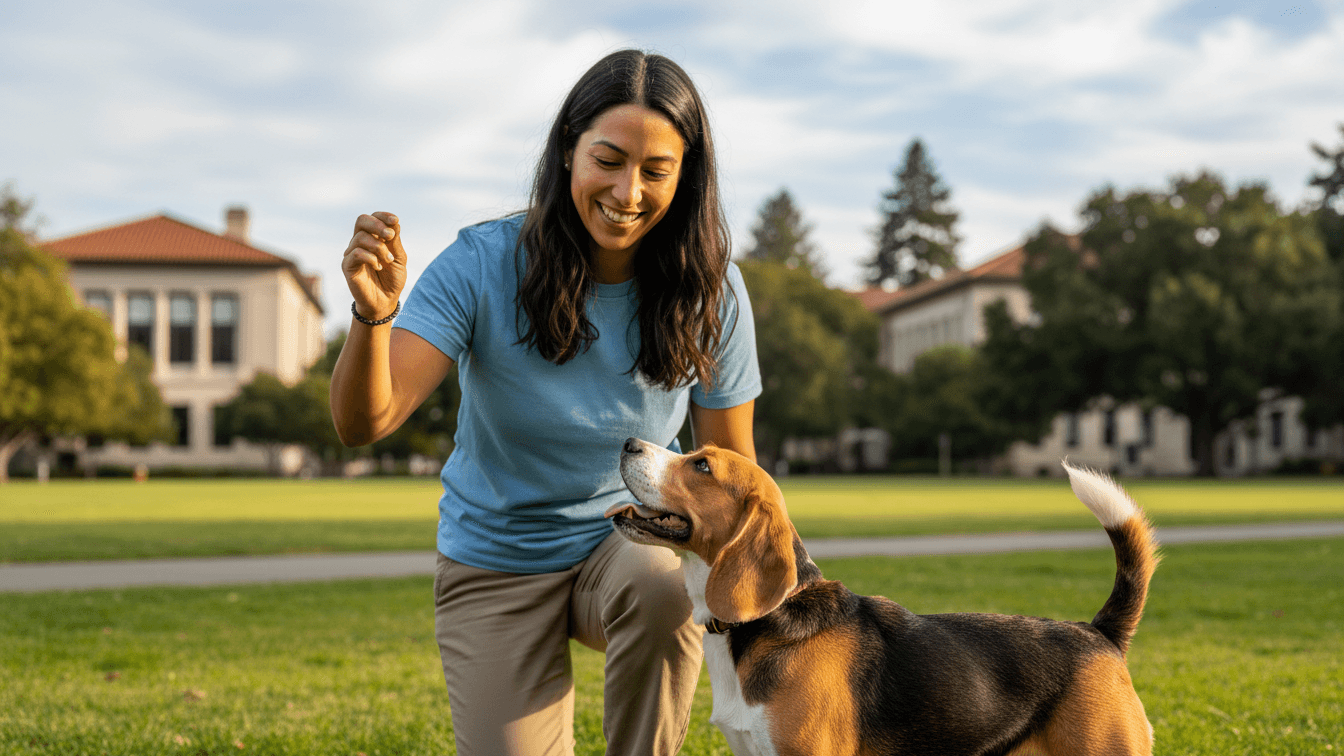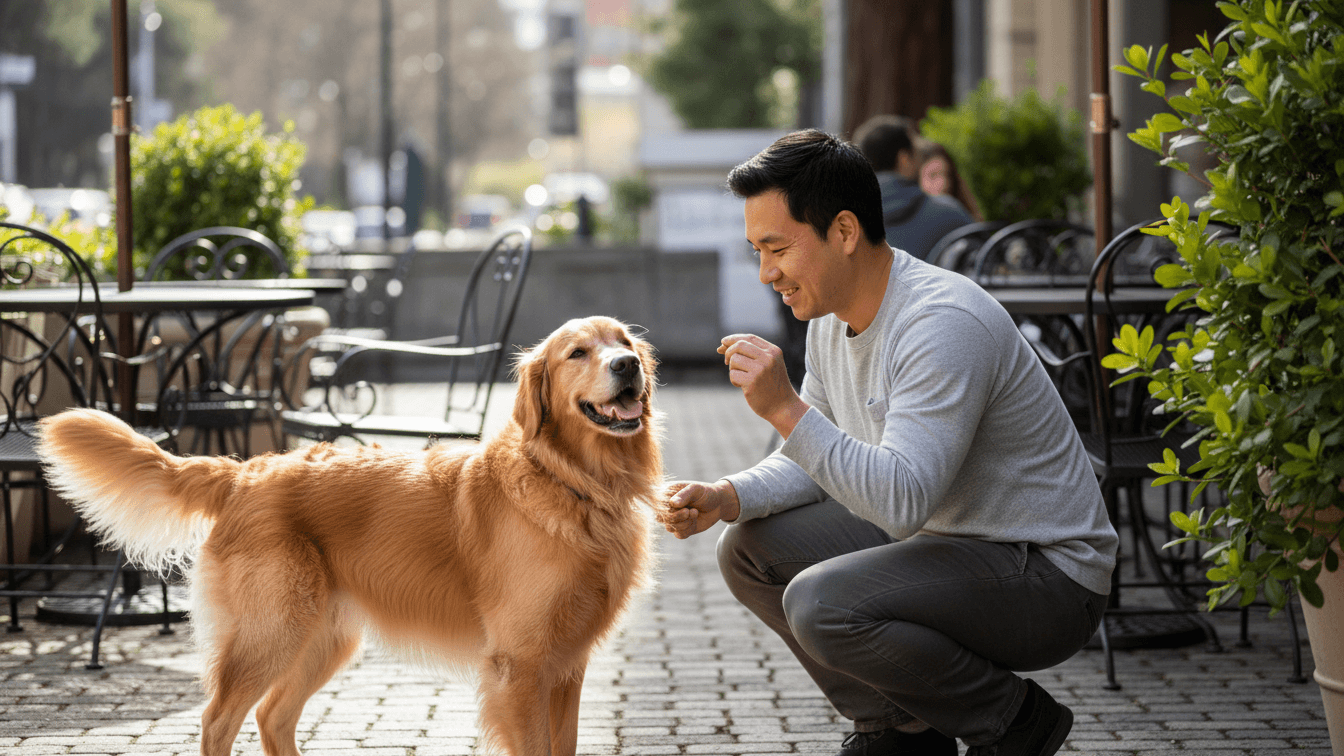Your Complete Guide to Choosing a Dog Trainer in Berkeley and Surrounding Areas
Living with a dog in Berkeley means navigating city streets filled with students, pedestrians, and cyclists, while also enjoying access to incredible hiking trails in the hills and waterfront parks along the bay. Your dog needs to handle all of this calmly, from loose-leash walks through bustling neighborhoods like North Berkeley and Downtown to staying polite when off-leash dogs approach at local parks.
Since Berkeley sits in Alameda County, most local rules follow city and county guidelines. When you find a trainer who understands these local details, you’ll get better results both at home and out in your community.
How to Choose the Right Trainer
Start by looking for someone who uses positive reinforcement training and can set realistic goals for your Berkeley lifestyle. This means your dog should learn to walk calmly past café patios on Telegraph Avenue, stay focused near the UC Berkeley campus crowds, and handle encounters with off-leash dogs without losing control.
Credentials give you a quick way to compare trainers’ experience levels. Common dog trainer certifications include KPA-CTP, CPDT-KA, or IAABC-CDBC for behavior problems. If your dog has serious aggression issues, look for someone with CBCC-KA or a science-based program like CTC.
In-home dog training works great for puppy manners, door greetings, and neighborhood leash skills. Group classes make sense once your dog can focus around other dogs, especially before you try busy spots like Ohlone Dog Park or Fourth Street shops.
Common Dog Training Methods Explained

Reward-based methods build the trust you want while creating lasting behavior changes. They also help you follow Berkeley’s rules about keeping dogs under control in public.
Basic obedience covers sit, down, stay, place, recall, and leash training so your dog can handle walks, restaurant patios, and park visits without pulling or jumping on people. These foundational skills matter even more in a dense urban environment where you’ll encounter distractions every few steps.
Puppy training focuses on socialization, potty training, bite control, crate comfort, and early leash work. Starting with short, positive training sessions prevents bad habits from forming in the first place. Berkeley’s dog-friendly culture means your puppy will encounter other dogs constantly, so early socialization becomes especially important.
Behavior modification addresses fear, reactivity, resource guarding, or separation anxiety through careful desensitization and counterconditioning. For serious cases, ask if your trainer works with local veterinarians. Berkeley’s high population density and urban noise levels can trigger reactivity in sensitive dogs, making expert support even more valuable.
Private lessons let you customize everything around your daily routines, while day training can speed up results when you’re short on time. Many Berkeley professionals appreciate day training programs that fit around demanding work schedules.
Dog training classes help your dog practice good manners around other dogs and people. The best classes give dogs plenty of space, screen participants carefully, and teach calm behavior rather than just excitement. Look for puppy classes that expose young dogs to Berkeley-specific challenges like BART trains, skateboards, and street musicians.
Specialized options like therapy dog training or service dog training require extra structure, public-access skills, and a very clear step-by-step training program. Berkeley has numerous hospitals, senior centers, and educational facilities where therapy dogs serve, making this a rewarding option for calm, friendly dogs.
Stay away from trainers who use fear, intimidation, or pain to get results. Humane methods are safer for everyone, easier to maintain long-term, and much better for keeping peace with your neighbors in Berkeley’s close-knit communities.
Average Cost of Dog Training in Berkeley CA (Updated for 2025)
Prices around Berkeley and Alameda County tend to run higher than many other California regions, reflecting the area’s cost of living and demand for professional dog training services. Here’s what most local pet owners are paying in 2025.
| Service Type | Average Cost (Berkeley/Alameda County) |
|---|---|
| Puppy classes (4-6 weeks) | $200-$350 total |
| Group obedience training (4-6 weeks) | $225-$400 total |
| Private lessons (60-90 min) | $150-$250 per session |
| In-home coaching packages (4-6 visits) | $600-$1,200 total |
| Day training (trainer works your dog + handoff) | $600-$1,200 per week |
| Behavior consult for reactivity/anxiety (initial) | $200-$350 |
| Board and train (2-4 weeks) | $3,000-$6,000 total |
You’ll probably pay extra travel fees for longer distances within Alameda County, and expect higher rates for complex behavior work or aggressive dog training cases.
Make sure you understand what’s included, how the trainer tracks progress, and whether they offer a free consultation before you sign up. Many Berkeley trainers include follow-up support and practice plans as part of their training program.
Questions to Ask a Potential Dog Trainer
- What training methods do you use, and how do you keep sessions positive and low-stress?
- What credentials do you have, like KPA-CTP or CPDT-KA? Do you keep up with continuing education such as CPDT-KSA?
- How will you customize the training plan for my dog’s specific needs and our Berkeley lifestyle?
- Do you offer in-home visits, group classes, or day training, and which approach fits my goals best?
- How will we measure my dog’s progress and know when to add more distractions?
- What are the total costs, including any travel fees, and what’s your cancellation policy?
- Do you carry liability insurance, and can you show me proof?
- For behavior problems, will you work with my veterinarian if needed?
- What should I practice between our training sessions to help my dog keep improving?
- Have you worked with dogs in urban environments like Berkeley before, and how do you handle off-leash dog encounters?
Local Berkeley Rules and Considerations
Berkeley enforces leash laws and nuisance rules to keep parks and neighborhoods safe for everyone. Alameda County follows California’s public health requirements too.
Dogs must be on leash in most public spaces throughout Berkeley, with specific exceptions for designated off-leash areas. The city requires dogs to be under control at all times, meaning your dog must respond to voice commands even in off-leash zones. You can review Berkeley’s complete municipal code regarding animal control on the city’s website.
California law requires current rabies vaccination for all dogs over four months old. Berkeley also requires a city dog license, which you can obtain through the Berkeley Animal Care Services. License fees are reduced for spayed or neutered dogs.
Excessive barking can be considered a public nuisance under Berkeley Municipal Code, so work with your trainer on alert barking and separation anxiety before neighbors start complaining. In Berkeley’s dense apartment buildings and close-set homes, noise issues become neighborhood problems quickly.
California doesn’t require special licenses for professional dog trainers, but if a business boards dogs for payment, they must comply with state kennel licensing requirements. Berkeley also has specific business license requirements for anyone operating a commercial dog training business within city limits.
Berkeley Animal Care Services provides resources for lost pets, low-cost spay and neuter programs, and other support for local dog owners. They also handle animal control enforcement and can answer questions about local regulations.
Local Berkeley Resources for Dog Owners
These spots give you great places to practice polite manners, work on recalls, and provide safe enrichment for your dog. Always follow the posted rules and etiquette guidelines.
- Ohlone Dog Park near the Berkeley Marina offers separate fenced areas for large and small dogs, with bay views and plenty of space for recall practice during quieter morning hours.
- Cedar Rose Dog Park in South Berkeley provides a smaller fenced area perfect for dogs still building confidence around other dogs.
- Cesar Chavez Park at the Berkeley Marina welcomes leashed dogs on its paved paths and open grass areas, giving you excellent opportunities to practice focus around kites, cyclists, and picnicking families.
- Tilden Regional Park in the Berkeley Hills offers miles of dog-friendly trails where leashed dogs can experience natural settings while building reliable obedience skills around wildlife and other hikers.

FAQs
How much does in-home dog training cost?
Most Berkeley trainers charge $150-$250 per in-home visit, with package discounts available when you buy multiple sessions. Complex behavior problems typically start at the higher end of that range.
Is in-home dog training worth it?
Absolutely, because you’re working on problems exactly where they happen. Your trainer can fix door manners, jumping on guests, counter-surfing, and yard reactivity right at home, then step outside to practice leash skills on your actual neighborhood sidewalks with real Berkeley distractions.
Can you pay someone to house train your dog?
Yes, many trainers offer puppy training programs that include potty training, crate routines, and daily schedules. Day training can speed up the process while teaching you how to maintain the progress once your dog comes home.
What is the 3-3-3 rule for dog training?
This is a helpful timeline for new or adopted dogs: expect about 3 days for your dog to decompress, 3 weeks to learn your routines, and 3 months to feel completely settled. Good training plans work with this natural adjustment period rather than against it.
How long will it take to reach my training goals?
Most puppies and friendly adult dogs show solid progress within 4-8 weeks if you practice daily. Fear, reactivity, or aggression typically requires several months of careful behavior modification with gradual increases in difficulty. Berkeley’s constant urban stimulation can extend timelines for anxious or reactive dogs.
What should I bring to group classes?
Pack a flat collar or harness, a 6-foot leash, high-value treats, water, and current vaccination records if your trainer requests them. Leave retractable leashes at home for safety reasons.
What’s the leash law in Berkeley?
Dogs must be leashed and under control in all public areas except inside designated off-leash zones at specific dog parks. Even in off-leash areas, dogs must respond to voice commands and cannot threaten or harass other people or animals. Keep that 6-foot leash handy for city sidewalks, parks, and shopping districts.
Do I need a dog license in Berkeley or Alameda County?
Yes, Berkeley requires all dogs over four months old to have a current city dog license. You’ll need proof of rabies vaccination to obtain the license through Berkeley Animal Care Services. License fees are lower for spayed or neutered dogs.
What shots does my dog need in Alameda County or California?
Rabies vaccination is required throughout California for all dogs over four months old. Your veterinarian may also recommend distemper-parvo combination vaccines, bordetella for kennel cough, and leptospirosis based on your dog’s lifestyle and exposure risk in urban Berkeley.
Are dog trainers required to be licensed in Berkeley or Alameda County or California?
No special trainer licenses exist in California. Professional dog trainers follow normal business regulations, and Berkeley requires a business license for commercial operations within city limits. If a trainer offers board and train services with overnight stays, their facility may need to meet state kennel licensing requirements.
Where can I practice off-leash recall?
Use fenced dog parks like Ohlone Dog Park or Cedar Rose Dog Park to keep things safe and legal while building your dog’s recall skills. Try visiting during quieter weekday morning hours when you’re starting out.
Which dog parks allow training around Berkeley?
Ohlone Dog Park and Cedar Rose Dog Park both allow off-leash play within their fenced areas, making them ideal for practicing recalls and socialization. Always follow posted rules and be respectful of other dogs and owners sharing the space.
What beaches or trails allow dogs for training?
While Berkeley doesn’t have beach access, Point Isabel Regional Shoreline just north in Richmond offers 23 acres of off-leash space along the bay. Within Berkeley, Tilden Regional Park provides miles of leashed dog-friendly trails through forests and meadows, perfect for building focus around deer, squirrels, and other hikers.
How do I help my dog handle Berkeley’s urban environment?
Work with your trainer to gradually expose your dog to city-specific challenges like BART trains, street musicians, skateboarding students, and sidewalk crowds. Start with quieter residential streets in areas like North Berkeley before progressing to busier corridors like Telegraph Avenue or Shattuck Avenue. A well-behaved dog in Berkeley needs confidence around constant movement, noise, and social interaction.
What if my dog is reactive to off-leash dogs on walks?
Off-leash dogs approaching on-leash dogs is unfortunately common in Berkeley despite leash laws. Work with a certified dog trainer experienced in reactivity and behavior modification to help your dog stay calm during these encounters. Practice management strategies like creating distance, using barriers, and teaching your dog to disengage and refocus on you.
The right combination of thoughtful planning, humane methods, and consistent practice around Berkeley’s parks and neighborhoods will help your dog become a confident, well-behaved companion. If credentials matter to you, don’t hesitate to ask about dog trainer certifications and how your trainer stays current with new techniques. Many expert dog trainers in Berkeley also offer a free evaluation to help you determine the best path forward for you and your dog.
